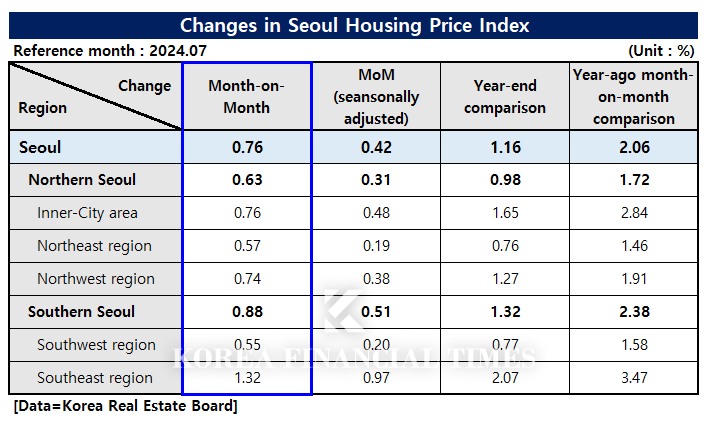The U.S. is expected to cut its benchmark interest rate in September due to a slowdown in the domestic economy caused by surging consumer prices and job insecurity. Wall Street analysts are highly speculating that the US will take this opportunity to make a 'big cut' of up to 0.5 percentage points.
On top of that, experts say that the price of apartments in Seoul has been on the rise for more than 60 weeks, and the spark for the rise in apartment sales prices remains large. The prospect of a decrease in new occupancy next year also adds to concerns over soaring housing prices.
In response, experts believe that the Bank of Korea is likely not to cut its benchmark interest rate in September. Experts generally predict that if the U.S. Federal Reserve lowers its policy interest rate (basic interest rate) in September as expected, the Bank of Korea will only start lowering it in October or November after checking household loans and real estate stability following the implementation of the second stage of the stress total debt repayment ratio (DSR).
Only the five major commercial banks (KB Kookmin, Shinhan, Hana, Woori, and NH Nonghyup) had more household loans by 4.1795 trillion won by the middle of this month. Lee Chang-yong, governor of the Bank of Korea, said after freezing the benchmark interest rate for 12 consecutive months last month, "All members of the Monetary Policy Committee agreed that the Bank of Korea should not make a mistake in triggering a rise in housing prices by excessively supplying liquidity or giving a wrong signal about the timing of a rate cut."
The key is how much the second stage of stress DSR, which is scheduled to be implemented in September, will affect the market. Stress DSR is a system that calculates the loan limit by imposing a certain level of additional interest rate (stress rate) when calculating DSR in preparation for the possibility that borrowers using variable-rate loans will increase their burden of repayment of principal and interest due to rising interest rates during the loan period.
In February this year, the government introduced a first-stage measure to apply 25 percent of the basic stress rate to bank mortgage loans.
“If the bomb of a rate cut is dropped while Seoul real estate is exploding like it is now, the house price explosion, which has been limited to Seoul, will spread from the metropolitan area to the provinces, causing tremendous chaos,” said a real estate expert. ”We have maintained interest rates in the 3% range without raising them to the 5% range while the U.S. raised interest rates to the 5% range, so even if the U.S. makes a big cut, it will not be easy for us to make such a cut because of the risks of decreasing foreign exchange reserves.”
Jang Hosung (hs6776@fntimes.com)
가장 핫한 경제 소식! 한국금융신문의 ‘추천뉴스’를 받아보세요~
데일리 금융경제뉴스 Copyright ⓒ 한국금융신문 & FNTIMES.com
저작권법에 의거 상업적 목적의 무단 전재, 복사, 배포 금지









![용산구 ‘나인원한남’ 88평, 9억 상승한 167억원에 거래 [일일 아파트 신고가]](https://cfnimage.commutil.kr/phpwas/restmb_setimgmake.php?pp=006&w=284&h=214&m=5&simg=2025071010042800278b372994c952115218260.jpg&nmt=18)










